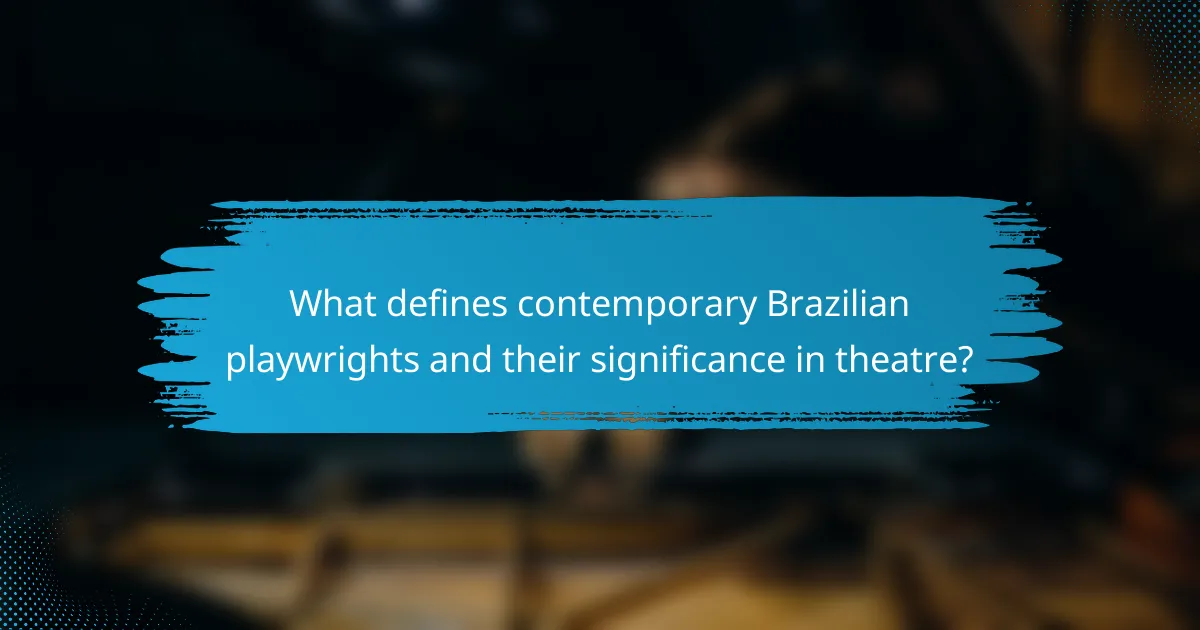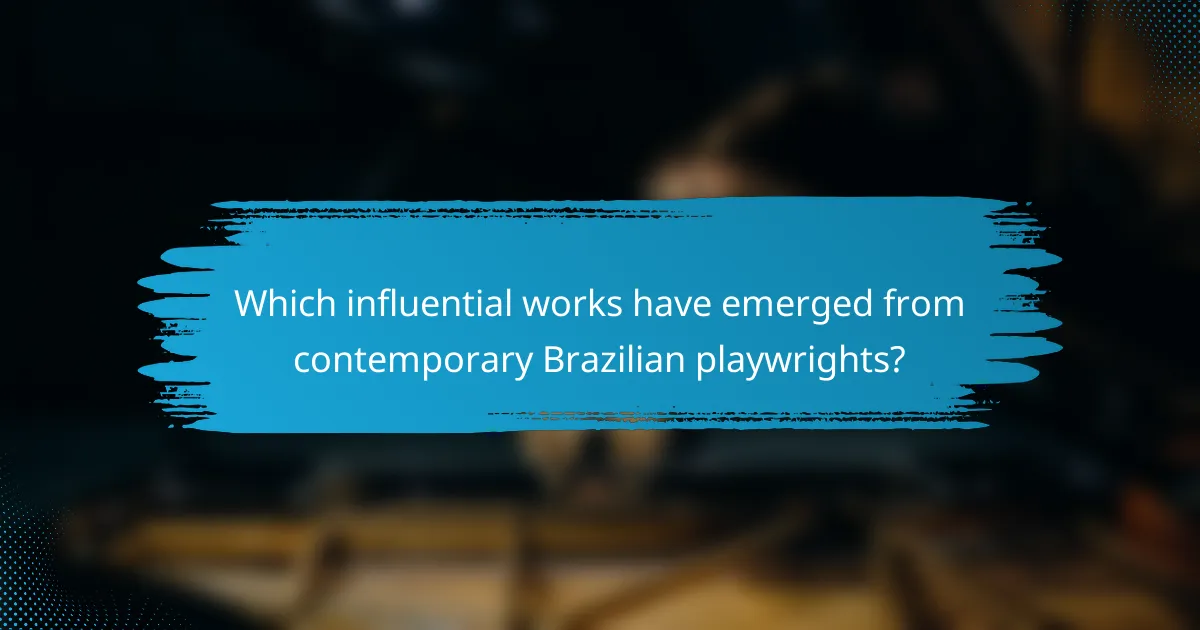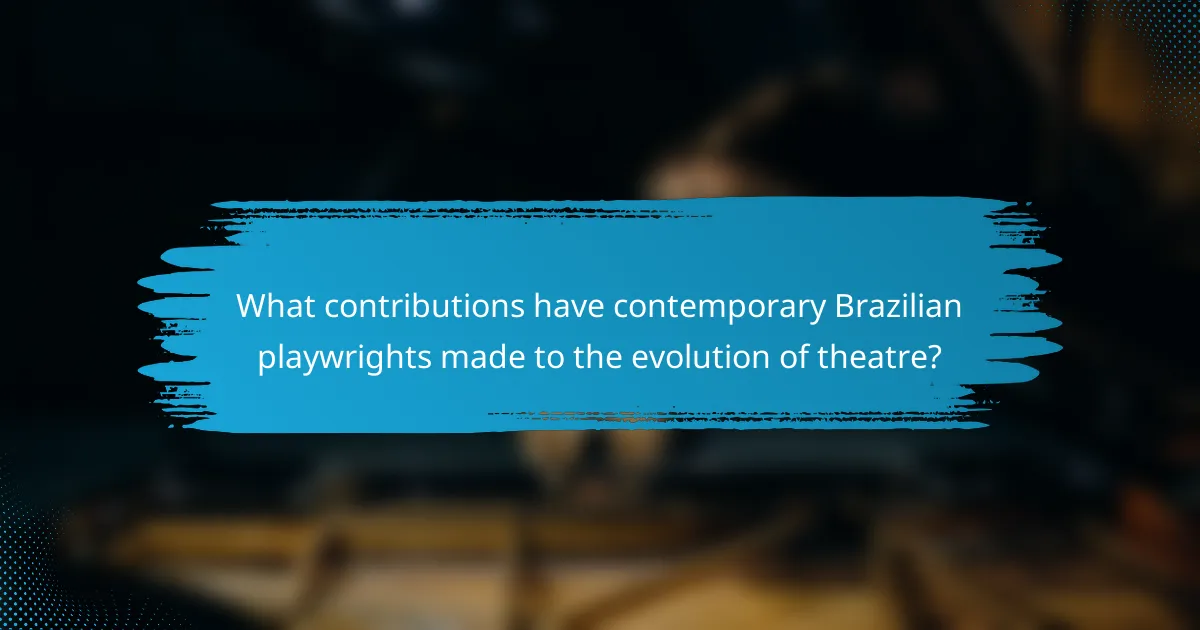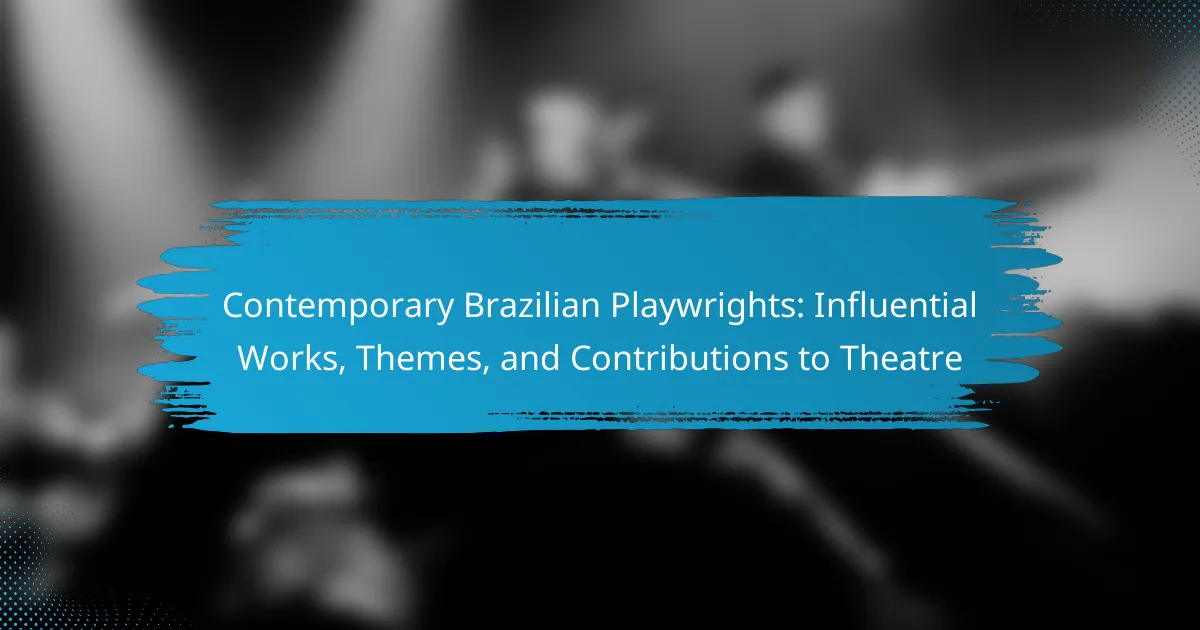Contemporary Brazilian playwrights are recognized for their innovative storytelling and engagement with pressing social issues, including identity, politics, and cultural heritage. Notable figures like Ariano Suassuna, Plínio Marcos, Aline Bei, Julián Sanches, and Leandro Andrade have made significant contributions to theatre, creating works that challenge traditional narratives and reflect the complexities of Brazilian society. Their plays often incorporate diverse voices and experimental forms, addressing themes of violence, political repression, and belonging. This evolution in Brazilian theatre not only resonates with local audiences but also plays a crucial role in shaping public discourse and artistic expression on a global scale.

What defines contemporary Brazilian playwrights and their significance in theatre?
Contemporary Brazilian playwrights are defined by their innovative storytelling and engagement with social issues. They often explore themes of identity, politics, and cultural heritage. Their works frequently challenge traditional narratives and incorporate diverse voices. Playwrights like Ariano Suassuna and Plínio Marcos have made significant contributions. They address the complexities of Brazilian society and history through their plays. This engagement resonates with audiences and encourages dialogue. Contemporary Brazilian theatre reflects the nation’s evolving cultural landscape. It plays a crucial role in shaping public discourse and artistic expression.
How have contemporary Brazilian playwrights influenced the global theatre landscape?
Contemporary Brazilian playwrights have significantly influenced the global theatre landscape through innovative storytelling and diverse themes. They often explore social issues, identity, and cultural conflicts. Works by playwrights like Ariano Suassuna and Plínio Marcos have introduced unique narratives that resonate internationally. Their integration of Brazilian folklore and history enriches global theatre, offering fresh perspectives. The rise of playwrights such as Jô Bilac and Marcio Abreu showcases modern techniques and experimental forms. Festivals like the São Paulo International Theatre Festival promote these playwrights globally. Their contributions have inspired international adaptations and collaborations, enhancing cross-cultural dialogue in theatre.
What are the key characteristics that distinguish contemporary Brazilian playwrights?
Contemporary Brazilian playwrights are distinguished by their innovative narrative styles and social engagement. They often incorporate elements of realism and magical realism in their works. Many explore themes of identity, race, and class struggles within Brazilian society. Their plays frequently challenge traditional structures and conventions of theatre. A notable characteristic is the use of colloquial language, making dialogue relatable to local audiences. Additionally, contemporary playwrights often collaborate with directors and actors to enhance their storytelling. The influence of Brazil’s diverse cultural heritage is evident in their works. Prominent figures include Ariano Suassuna and Plínio Marcos, who reflect Brazil’s socio-political landscape through their plays.
What role do contemporary Brazilian playwrights play in cultural representation?
Contemporary Brazilian playwrights play a crucial role in cultural representation. They explore diverse social issues such as race, gender, and class. Their works often reflect Brazil’s multicultural society. Playwrights like Gerald Thomas and Plínio Marcos challenge societal norms through their narratives. They give voice to marginalized communities and highlight their struggles. This representation fosters empathy and understanding among audiences. Furthermore, their plays often incorporate elements of Brazilian folklore and history. This blend of tradition and modernity enriches the national cultural landscape.
What themes are prevalent in the works of contemporary Brazilian playwrights?
Contemporary Brazilian playwrights often explore themes of identity, social inequality, and political critique. These themes reflect Brazil’s diverse cultural landscape and complex socio-political history. Identity is frequently examined through the lenses of race, gender, and class. Social inequality is depicted through narratives that highlight the struggles of marginalized communities. Political critique addresses issues such as corruption and authoritarianism, often drawing from Brazil’s turbulent past. Notable playwrights like Ariano Suassuna and Plínio Marcos have significantly contributed to these themes in their works. Their plays often serve as a mirror to society, prompting reflection and dialogue among audiences.
How do social issues shape the narratives of contemporary Brazilian theatre?
Social issues significantly shape the narratives of contemporary Brazilian theatre. These narratives often reflect the realities of social inequality, political corruption, and cultural identity. Playwrights like Augusto Boal and Nelson Rodrigues have addressed themes of oppression and resistance. Their works highlight the struggles of marginalized communities. For example, Boal’s “Theatre of the Oppressed” engages audiences in social dialogue. Additionally, contemporary plays often incorporate elements of Brazilian folklore and history. This blend enriches the narratives with cultural significance. The impact of social issues is evident in the works presented at festivals like the São Paulo Theatre Festival. These productions frequently challenge societal norms and provoke critical discussions.
What cultural elements are commonly explored in contemporary Brazilian plays?
Contemporary Brazilian plays commonly explore themes of identity, social inequality, and cultural diversity. These plays often reflect Brazil’s complex social fabric. They address issues such as race, class, and gender. Many playwrights incorporate elements of Afro-Brazilian culture and indigenous perspectives. The use of regional dialects and local folklore is prevalent. Additionally, contemporary plays frequently critique political corruption and social injustice. This exploration is rooted in Brazil’s historical context and ongoing societal challenges.

Which influential works have emerged from contemporary Brazilian playwrights?
Contemporary Brazilian playwrights have produced several influential works. Notable examples include “Oração para o Filho da Guerra” by Aline Bei. This play addresses themes of violence and loss in contemporary society. Another significant work is “A Resistência” by Julián Sanches. It explores the impact of political repression on personal lives. “O Silêncio” by Leandro Andrade is also important. It tackles issues of identity and belonging. These works reflect the complexities of modern Brazilian life and resonate with audiences. They have contributed to the evolution of Brazilian theatre.
What are some landmark plays by contemporary Brazilian playwrights?
“Landmark plays by contemporary Brazilian playwrights include ‘O Rei da Vela’ by Jorge Andrade. This play is considered pivotal in Brazilian theater. Another significant work is ‘A Dama da História’ by João das Neves. It explores themes of power and identity. ‘O Mágico de Oz’ by Fernando Peixoto is also noteworthy. It presents a unique interpretation of the classic story. These plays reflect the rich cultural landscape of Brazil. They address social issues and human experiences. Their impact continues to influence modern Brazilian theater.”
How do these plays reflect the socio-political context of Brazil?
Contemporary Brazilian plays reflect the socio-political context of Brazil by addressing issues such as inequality, corruption, and identity. These works often critique government policies and social injustices. For instance, playwrights like Ariano Suassuna and Plínio Marcos use their narratives to challenge societal norms. Their plays frequently depict the struggles of marginalized communities. This representation resonates with Brazil’s historical context of dictatorship and socio-economic disparity. The themes in these plays serve as a mirror to the ongoing political discourse in Brazil. By incorporating real-life events and cultural references, they engage audiences in critical conversations about their society.
What innovations in storytelling and structure can be seen in these works?
Contemporary Brazilian playwrights exhibit innovations in storytelling and structure through non-linear narratives and multi-layered characters. These works often intertwine personal and political themes, reflecting Brazil’s complex societal issues. Techniques such as breaking the fourth wall engage audiences directly, creating immersive experiences. Additionally, the use of fragmented timelines challenges traditional storytelling methods. Playwrights incorporate multimedia elements to enhance emotional impact. This integration of various art forms enriches the theatrical experience. The blending of genres, such as drama and comedy, adds depth to the narratives. Overall, these innovations reflect a dynamic evolution in Brazilian theatre.
What impact have these works had on audiences and critics?
Contemporary Brazilian playwrights have significantly impacted audiences and critics. Their works often explore social issues, provoking thought and discussion. Audiences have engaged deeply with themes of identity, politics, and culture. Critics have praised the innovative narrative styles and diverse voices presented in these plays. The emotional resonance of the characters has led to a strong connection with viewers. Additionally, these works have influenced the evolution of Brazilian theatre. The critical reception has highlighted their importance in reflecting contemporary society. Overall, the impact is evident in both audience engagement and critical acclaim.
How have contemporary Brazilian plays been received in international theatre festivals?
Contemporary Brazilian plays have received positive acclaim in international theatre festivals. Many productions showcase innovative storytelling and diverse themes. Festivals in Europe and North America have highlighted these works. For example, the Festival d’Avignon in France has featured Brazilian plays prominently. Critics often praise the unique cultural perspectives presented in these performances. This reception has led to increased visibility for Brazilian theatre on the global stage. Additionally, collaborations with international artists have enriched the productions. Overall, contemporary Brazilian plays are recognized for their artistic merit and cultural significance.
What critical acclaim or awards have contemporary Brazilian playwrights achieved?
Contemporary Brazilian playwrights have received significant critical acclaim and numerous awards. Notable playwrights like Nelson Rodrigues and Plínio Marcos have been recognized for their impactful contributions. The São Paulo Art Critics Association often honors playwrights with awards for excellence in theatre. The prestigious Shell Award for Theatre has celebrated various contemporary playwrights for their innovative works. Additionally, playwrights such as Aline Valek have gained recognition in international theatre festivals. The recognition extends to the Brazilian Theatre Award, which highlights outstanding achievements in the field. These accolades underscore the vibrant and influential landscape of contemporary Brazilian theatre.

What contributions have contemporary Brazilian playwrights made to the evolution of theatre?
Contemporary Brazilian playwrights have significantly shaped the evolution of theatre through innovative themes and experimental forms. They have introduced diverse narratives that reflect Brazil’s complex social issues. Playwrights like Nelson Rodrigues and Ariano Suassuna challenged traditional storytelling methods. Their works often blend realism with magical elements, creating a unique theatrical language. Additionally, contemporary playwrights have explored identity, gender, and race, fostering critical dialogue within society. The incorporation of multimedia and interactive elements in performances has also modernized the theatrical experience. This evolution has led to a rich tapestry of Brazilian theatre that resonates globally.
How have contemporary Brazilian playwrights influenced theatrical practices and methodologies?
Contemporary Brazilian playwrights have significantly influenced theatrical practices and methodologies through innovative storytelling and diverse themes. They have introduced new narrative structures that challenge traditional linear storytelling. This has led to a more fragmented and experimental approach in productions. Playwrights like Jorge Andrade and Plínio Marcos have explored social issues, reflecting Brazil’s complex realities. Their works often incorporate elements of popular culture and multimedia, enhancing audience engagement. The use of improvisation and audience interaction has also become more prevalent in Brazilian theatre. This shift encourages a more participatory experience for viewers. Overall, contemporary Brazilian playwrights have reshaped the landscape of theatre by merging artistic expression with social commentary.
What collaborative efforts exist between contemporary playwrights and other art forms?
Contemporary playwrights engage in various collaborative efforts with other art forms. These collaborations often include partnerships with visual artists, musicians, and filmmakers. For instance, playwrights may work with visual artists to create immersive stage designs that enhance storytelling. They often collaborate with composers to integrate original scores into their productions. Additionally, some playwrights partner with filmmakers to adapt their works for screen, expanding their reach. These collaborations enrich the theatrical experience and foster cross-disciplinary innovation. Collaborative projects can also lead to new forms of performance art, blending theatre with dance and multimedia elements.
How do contemporary Brazilian playwrights engage with emerging technologies in theatre?
Contemporary Brazilian playwrights engage with emerging technologies in theatre by integrating digital media, interactive elements, and virtual reality into their productions. They utilize multimedia projections to enhance storytelling and create immersive experiences for audiences. Playwrights like Felipe Hirsch and Jô Bilac incorporate social media as a narrative tool, allowing for audience interaction during performances. Additionally, they explore the use of live streaming to reach wider audiences, especially during the COVID-19 pandemic. These innovations reflect a shift towards modernizing traditional theatre practices. Research indicates that this blend of technology and performance fosters new forms of artistic expression and audience engagement.
What are the challenges faced by contemporary Brazilian playwrights today?
Contemporary Brazilian playwrights face numerous challenges today. Economic constraints limit funding for productions and new works. This financial pressure affects the ability to stage innovative plays. Additionally, censorship issues hinder creative expression. Political climate influences the themes that playwrights can explore. Limited access to international markets restricts exposure for Brazilian theatre. Competition from digital media diverts audiences from live performances. Furthermore, a lack of institutional support can stifle emerging talent. These factors collectively impact the vibrancy of contemporary Brazilian theatre.
How do economic and political factors impact the production of contemporary plays?
Economic and political factors significantly impact the production of contemporary plays. Economic conditions influence funding availability for theatre companies. Limited budgets can restrict the scope and scale of productions. Political climates affect the themes and subjects playwrights choose to explore. Censorship can arise in politically charged environments, limiting creative expression. Additionally, government support for the arts varies with political priorities. Economic downturns often lead to reduced audience spending on entertainment. In Brazil, for instance, economic crises have historically led to fewer productions and layoffs in the theatre sector. Thus, the interplay of these factors shapes the landscape of contemporary theatre production.
What barriers exist for new voices in contemporary Brazilian theatre?
New voices in contemporary Brazilian theatre face several barriers. Limited access to funding restricts opportunities for emerging playwrights. The dominance of established artists creates a competitive environment that is hard to penetrate. Additionally, there is often a lack of representation for diverse voices in the industry. Institutional support tends to favor traditional narratives over innovative or experimental works. Networking opportunities are also limited, making it challenging for new playwrights to connect with influential figures. The language barrier can hinder playwrights from different regions in Brazil from gaining visibility. Overall, these factors contribute to a challenging landscape for new voices in Brazilian theatre.
What are some best practices for engaging with contemporary Brazilian theatre?
Engaging with contemporary Brazilian theatre involves attending performances regularly. This helps to understand the evolving narratives and styles. Participating in discussions with theatre practitioners enriches the experience. Reading plays by contemporary Brazilian playwrights provides deeper insights into their themes. Following local theatre companies on social media keeps audiences informed about upcoming productions. Exploring festivals dedicated to Brazilian theatre showcases diverse works and talents. Supporting community theatres fosters local talent and innovation. Lastly, analyzing critiques and reviews enhances appreciation of the artistic choices made in performances.
How can audiences deepen their understanding of contemporary Brazilian plays?
Audiences can deepen their understanding of contemporary Brazilian plays by engaging with the cultural and historical context of the works. This includes studying Brazil’s socio-political landscape, which heavily influences playwrights. Reading critical analyses and reviews of the plays enhances comprehension of the themes and techniques used by the authors. Attending discussions, workshops, or lectures led by experts in Brazilian theatre provides valuable insights. Additionally, exploring adaptations and performances of these plays can offer different interpretations and perspectives. Familiarity with key playwrights, such as Ariano Suassuna and Plínio Marcos, enriches appreciation of their unique contributions to the genre.
What resources are available for exploring the works of contemporary Brazilian playwrights?
Resources for exploring the works of contemporary Brazilian playwrights include academic journals, online databases, and theater archives. Academic journals like “Theatre Journal” and “Latin American Theatre Review” publish articles on Brazilian playwrights. Online databases such as JSTOR and Project MUSE provide access to scholarly papers and critiques. Theater archives, including those at the National Library of Brazil, house scripts and production materials. Additionally, websites like the Brazilian Playwrights Association offer insights and resources. These resources collectively enable in-depth exploration of contemporary Brazilian theater and its playwrights.
Contemporary Brazilian playwrights are defined by their innovative storytelling and engagement with social issues, exploring themes of identity, politics, and cultural heritage. This article examines their significant influence on both national and global theatre, highlighting key characteristics, prevalent themes, and landmark works that reflect Brazil’s socio-political context. It also addresses the challenges faced by these playwrights and their contributions to the evolution of theatrical practices, emphasizing the role of collaboration and emerging technologies. Resources for deeper exploration of their works are provided, enhancing understanding of this dynamic aspect of contemporary theatre.
